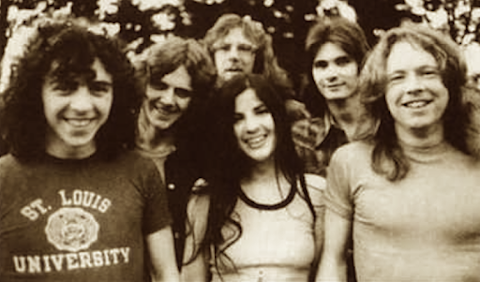#Silly Wizard #Andy M. Stewart #Phil & Johnny Cunningham #Scottish folk #Irish folk #Celtic music #traditional
Silly Wizard were pioneers in developing the modern Scottish folk group blueprint, popularizing Scottish music around the world through playing traditional music with a never-before-heard energy, spirit and spontaneity and introducing original songs and tunes written from within the tradition.
Formed in 1972 by guitarists Gordon Jones, Bob Thomas and Bill Watkins and named after a character who shared their Edinburgh flat, Silly Wizard began playing at the capital’s Triangle Folk Club. Soon after singer Chris Pritchard replaced Bill Watkins they added a teenager who would go on to play a crucial part in the band’s image as well as their music, Johnny Cunningham. A tremendously exciting, virtuosic fiddler, who was still at school and often had to be picked up from and returned to the school gates after overnight drives from gigs, Johnny energized the band’s live performances and helped to generate a new young following for folk music.
By the time they released their first album, Silly Wizard in 1976, the band had become a sextet, including Andy M. Stewart, a singer and songwriter with the tradition in his soul, and bass guitar powerhouse Martin Hadden, and were touring regularly throughout the UK and Europe. They were shortly to add a second virtuoso named Cunningham, with Johnny’s younger brother, Phil, replacing Freeland Barbour on accordion, and went on to break into the American market in the most spectacular manner.
Booked to play an opening twenty-minute spot in front of an audience of thousands at Philadelphia Folk Festival in 1979, Silly Wizard, now in its classic five-piece line-up (Bob Thomas having left) won a standing ovation and almost instantly created a huge demand in the US for a brand of folk music that could be as passionate in the low gears as it could be rousingly intense at full tilt and was always presented with wit and an infectious sense of fun.
So began a golden era as Silly Wizard not only headlined folk festivals on both sides of the Atlantic and were capable of selling out the 3000-plus capacity Playhouse in their home town but also branched out into theatre work with the Everyman Theatre in Liverpool and composed and performed the theme tune for Scottish Television’s Take the High Road as well as releasing a succession of consistently high quality, strong-selling albums.
Silly Wizard continued working at a frenetic pace until 1988, when the band that had also included singer Maddy Taylor, bassists Neil Adam and Alastair Donaldson and Dougie Maclean deputising for Johnny Cunningham on fiddle left a gap in Scottish music that has never been filled.
Gordon Jones, Bob Thomas and Martin Hadden went to achieve success in the production side of the recording business. Andy M. Stewart formed acclaimed duos, first with Manus Lunny then with Gerry O’Beirne. Phil Cunningham remains at the forefront of traditional music in his partnership with Aly Bain and his role at the Royal Conservatoire of Scotland. Johnny Cunningham, after settling in New York, died tragically young in 2003. From: https://projects.handsupfortrad.scot/hall-of-fame/silly-wizard/










